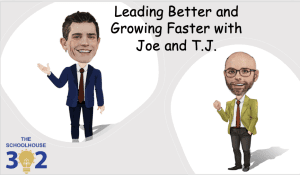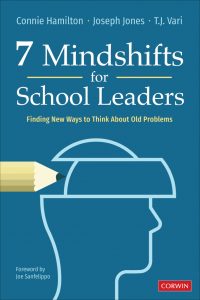
The Undercurrents of Decision-Making: A School Leader’s Guide
Brian has been a school principal for three years, and he finally feels that he’s finding his stride. While talking with Brian about his goals for the school year and the successes he has had to date, we found ourselves continually circling back to the various reactions that people have to certain decisions. Brian noted that his estimation of peoples’ responses was wrong at times, too often in fact. What he thought would create a major kickback recently, didn’t cause a stir, yet another decision he made, which was seemingly harmless, caused staff to panic. Perhaps, as a school leader, you can relate.
Every decision you make, big or small, creates undercurrents that ripple throughout the school community. These undercurrents can potentially have a profound impact on the staff, students, the greater school community, and, ultimately, the direction of the school.
Schools are notorious for implementing countless initiatives, all with good intentions in the name of a “need” or an “improvement.” We’ve implemented many of these initiatives ourselves–with varying degrees of success, mind you. School leaders embark on these new journeys to improve their schools, yet we find a spectrum of results, reactions, and responses to what we propose.
It’s probably not surprising, but we’ve yet to meet a school or district leader who willingly disrupts a school simply to wreak havoc on it. Yet, albeit comforting, we’ve also yet to find a school leader who didn’t have experience with the implementation of something that would help students, only to be met with despair by the staff. Despite what some would like to believe, school leaders want to improve student performance while supporting teachers, typically with the least amount of disruption possible. It just doesn’t work out that way.
Unfortunately, what is often underestimated is the scope of the initiative and the numerous decisions that will create countless undercurrents. Let’s take a look at some of the top initiatives implemented over the last couple of years. We’re sure that you could add to this list below.
• Technology Integration: Many school leaders have aggressively sought to integrate technology into the classroom with the goal of enhancing the student learning experience and improving their digital literacy skills.
• Personalized Learning: Many classrooms are very diverse and in multiple ways. Tailoring education is not just nice to do; we know that meeting individual students’ needs benefits all students.
• STEM Education: Schools are very aware of the need to promote Science, Technology, Engineering, and Mathematics education programs to prepare students, especially students of color and female students, who are traditionally underrepresented for careers in these high-demand fields. STEM is the future of the economy.
• Social and Emotional Learning (SEL): It cannot be said enough, especially after COVID, schools know the importance of emotional intelligence and the interpersonal skills necessary for student development, alongside academic achievement.
• Diversity, Equity, and Inclusion: Schools have also focused heavily on creating inclusive and equitable learning environments that recognize, address, and support the diverse needs of students from various backgrounds. It’s important to note that it is the role of a school leader to confront and alter inequities, yet even these initiatives can be met with resistance.
These five areas are massive efforts and require a tremendous amount of time and expertise to get right and implement effectively. These aren’t programs or short, quick fixes, but rather holistic efforts to effectively meet the needs of our students and the demands of our communities.
Consider SEL as an example. SEL is not new, but the intentionality and focus within the curriculum and other school-wide efforts is a new approach to it. To illustrate the depth of the initiative, we’ve built TheSchoolHouse302 Initiative Chart to demonstrate how detailed and involved a particular initiative can be.

We share this chart not as a “How To” on implementing initiatives, although that’s important; instead, our focus is on the details that this provides, which reveals just how each aspect of the initiative is very involved and requires a large degree of work. If it looks a little overwhelming, it’s okay to acknowledge that an SEL initiative is a large undertaking. Underestimating the scope of an initiative is one of the most common mistakes that a new (and seasoned) leader makes.
Each of the 7 areas can be broken down into several smaller segments to detail the intricate work that needs to take place for successful implementation. Going through this exercise is powerful because it not only shapes the scope of work but, more importantly, provides a view into what the work entails and how it involves and impacts the school community. Remember, your decision to embark on any new journey is either going to have a ripple effect toward success or trigger negative ways of dissent.
Rippling Toward Success or Triggering Negative Waves of Dissent
It can’t be said enough that the decisions you make as a school leader have the power to create positive or negative undercurrents that can shape the entire school community. By being mindful of the impact of your decisions and by making choices that are in the best interests of the school, you can create a more positive and productive learning environment for everyone, even when you’re making significant changes and improvements. To do so, perception and mindfulness are two skills that school leaders must master.
The Power of Perception
One of the most important things to remember as a school leader is that your decisions are not just about the content of the decisions themselves, but also about how they are perceived. As American political consultant and strategist Lee Atwater said, “Perception is reality.” Every decision you make sends a message to the school community about your values, priorities, and commitments to creating a positive learning environment.
For example, if you make a decision that is seen as unfair or unjust, it can create an undercurrent of skepticism and resentment among staff and students. This can make it difficult to implement other initiatives and can even lead to a decline in morale and productivity.
On the other hand, if you make decisions that are seen as thoughtful, transparent, and in the best interests of the school community, it can create an undercurrent of support and positivity, rippling out toward success. This can make it easier to implement new initiatives in the future and can foster a more collaborative and productive school environment. We can’t overstate how critical transparency and approachability are for school leaders.
The Importance of Mindfulness
The second critical skill is mindfulness. We believe the mindful leader to be a present leader. As a school leader, it is important to be mindful of the potential impact of your decisions. This means being fully present and mindful when making decisions. Take the time to consider the different perspectives of the school community and weigh the potential consequences of your actions. It also means being open to feedback and making adjustments as needed.

Here are some tips for being more mindful as you’re making decisions:
- Be present: With social media, email, and other buzzing, flashing devices, school leaders can often be swept away from a conversation right at the moment. Avoid this by committing to be present when you’re gathering input or communicating a decision. There’s nothing worse than a school leader whose attention is divided.
- Consult with others: Get input from a variety of stakeholders, including staff, students, parents, and community members. Great leaders surround themselves with individuals who are willing to say what needs to be said and who have the perspective of the community at heart.
- Consider the long-term impact: Don’t just think about the immediate consequences of your decisions. We believe this is why so many educators are frustrated. For too long, leaders have made decisions for short-term wins without taking into account the long-term consequences. Considering how decisions might affect the school community in the years to come is the hallmark of a future-driven leader. Don’t miss what Donya Ball says about it.
- Be open to feedback: We know this is hard, but as Maxwell explains in his Law of Solid Ground, trust is the foundation for success; it requires a culture that expects courageous conversations and candid feedback. Be willing to listen to feedback from others and make adjustments to your plans as needed. Don’t forget, too, that one step in the implementation phase is making sure that implementers are getting feedback and taking action on it.
As we always say, leadership is complex, but it does not have to be complicated. One powerful way to uncomplicate leadership is through effective decision-making. This involves understanding the undercurrents created by decisions–the ripple effects that extend beyond the immediate outcome toward clearer waters or waves of dissent. The use of our Initiative Implementation Chart contributes to creating positive undercurrents that foster trust and, ultimately, advance student learning and overall school success.
As always, we want to hear from you. Please hit us with a like, a follow, a comment, or a share. It helps us and it helps other readers, like you, to find our work so that more school leaders can lead better and grow faster.
We can’t wait to hear from you.









 7 Mindshifts for School Leaders: Finding New Ways to Think About Old Problems.
7 Mindshifts for School Leaders: Finding New Ways to Think About Old Problems. 


